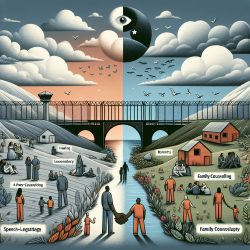In the realm of speech-language pathology, making data-driven decisions is paramount to ensuring effective and tailored interventions. A recent study titled "Donnes langagires franco-ontariennes : effets du contexte minoritaire et du bilinguisme / Franco-ontarian Speech Data: The Effects of a Minority Context and Bilingualism" offers valuable insights that can significantly impact the practice, especially when working with Franco-Ontarian children. This blog aims to distill key findings from the research and provide actionable strategies for practitioners.
Understanding the Research
The study investigates the linguistic competencies of Franco-Ontarian children, both monolingual and bilingual, and compares them with their Franco-Quebecois counterparts. The research highlights the complexities faced by speech-language pathologists (SLPs) due to the lack of region-specific tools and norms.
The study was conducted in two phases:
- Replication of a Quebec study with 26 monolingual Franco-Ontarian children.
- Assessment of 48 bilingual (French-English) Franco-Ontarian children.
Key findings include:
- Monolingual Franco-Ontarian children performed comparably to Franco-Quebecois children.
- Bilingual Franco-Ontarian children exhibited lower scores than their monolingual peers in several linguistic measures.
- Quebec-based standards may not be fully applicable to Franco-Ontarian children.
Implications for Practice
For practitioners, these findings underscore the importance of context in language development and the need for region-specific assessment tools. Here are some strategies to enhance practice:
1. Tailor Assessments
Given the unique linguistic environment of Franco-Ontarian children, SLPs should consider using or developing assessment tools that reflect the regional linguistic context. This can help in accurately identifying language competencies and areas needing intervention.
2. Focus on Exposure
The study suggests that the quantity and quality of language exposure significantly impact linguistic development. Practitioners should encourage parents and educators to provide rich linguistic environments, both at home and in educational settings, to support language acquisition.
3. Monitor Bilingual Development
For bilingual children, it's crucial to monitor both languages' development and understand how each influences the other. This dual focus can help in designing interventions that support balanced bilingualism and address any language-specific challenges.
4. Advocate for Resources
SLPs should advocate for the development and dissemination of region-specific resources and tools. Collaborating with researchers and educational institutions can facilitate the creation of comprehensive assessment batteries tailored to the needs of Franco-Ontarian children.
Encouraging Further Research
This study provides a foundation, but further research is needed to refine assessment tools and intervention strategies. Practitioners are encouraged to engage in or support research initiatives that explore the nuances of language development in minority and bilingual contexts.
To read the original research paper, please follow this link: Donnes langagires franco-ontariennes : effets du contexte minoritaire et du bilinguisme / Franco-ontarian Speech Data: The Effects of a Minority Context and Bilingualism.










